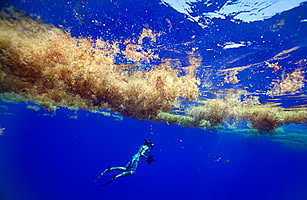
(2 of 4)
Earle aims to stop it. She has launched the nonprofit Mission Blue to build support for marine sanctuaries around sensitive hot spots — she calls them hope spots — in the endangered oceans, including the high seas beyond any one country's control. If her goal is audacious — we don't even have the legal institutions yet to protect international waters — so is Earle. "I can't think of many others who've been as persistent and vocal and forward-thinking on the oceans as Sylvia," says Greg Stone, chief scientist for oceans at Conservation International. "The world is opening up to her message." The often fractious marine-conservation movement — along with new corporate allies like Google — is making a concerted push for attention under the Mission Blue banner, focusing on reducing overfishing and expanding protection. The island nations of the central Pacific — home to some of the last truly pristine open waters on the planet — are moving to create a network of protection across their oceanscape, and the Obama Administration has announced an oceans policy that involves managing U.S. waters, not just exploiting them. "This idea's time has come," says venture capitalist David Shaw, who has devoted time and money to Earle's ideas. "And Sylvia embodies it."
From Pioneer to Protector
When Earle began working in marine science in the 1950s, there were few women in the field. She was allowed on a scientific voyage in the early '60s only after she agreed to help with the dishes and the cooking. She began diving off Florida at 17 — using a helmet, compressed air and weights — and by 1970 she was an aquanaut, leading an all-female team of scientists who lived and worked for two weeks in an undersea station off a Caribbean island. It was then that she learned to love diving deep, seeing the ocean far below and far away from human beings.
The desire to go deeper eventually pushed Earle out of academia. She co-founded a company to design and build her own subs, and in 1979 she set the record for solo untethered diving, walking on the seafloor 1,250 ft. below the surface in a JIM, or atmospheric diving suit. She's spent about 7,000 hours diving — that's nearly 10 months of her life, sleeping and waking — earning her the nickname Her Deepness. At 75, the elfin Earle still dives. "Every time I slip into the ocean," she says, "it's like going home."
She began her career in the heroic age of ocean exploration, when Jacques Cousteau roamed the seas in his ship Calypso and the Trieste went to the bottom of the Mariana Trench. But she's also seen the degradation of the oceans up close — the tortures endured by her home waters in the Gulf of Mexico, the steady evidence that we were fishing out the seas. And she is aware that we've lost far more than we can know. There is evidence, sketchy but still there, that sea life was once far more robust than it was even in our recent memory, that cod off New England were once so abundant that the fish jumped onto ships, and oysters so plentiful that 700 million were sold in New York City in 1880. The result is what the French marine scientist Daniel Pauly has called "shifting baselines": we can't tell how bad it's gotten because we don't remember how good it was. "The seas today are at very low abundance for many of the things that we rely on for food," says Callum Roberts, a marine-conservation biologist at England's University of York. "Many species have fallen a thousandfold from what they once were."
Earle has always been involved in conservation — she was the chief scientist at the National Oceanic and Atmospheric Administration in the early 1990s and is an explorer in residence at the National Geographic Society — but over the past few years, she's looked to intensify those efforts. Marine conservation, however, has always been a stepchild in environmentalism, and the groups involved are often small and fractured. Earle was looking for a big stage, and she got one in 2009, when she addressed Technology, Entertainment, Design (TED), the major conference that connects tech heavyweights with innovative scientists and thinkers. Every year TED grants a prize to one speaker who makes a "wish to change the world." Earle's was simple: "a campaign to ignite public support for a global network of marine protected areas." She won the prize. "We recognized that her mission to save the ocean is one that can only be achieved if we harness all of the resources available to us," says Chris Anderson, TED's curator.